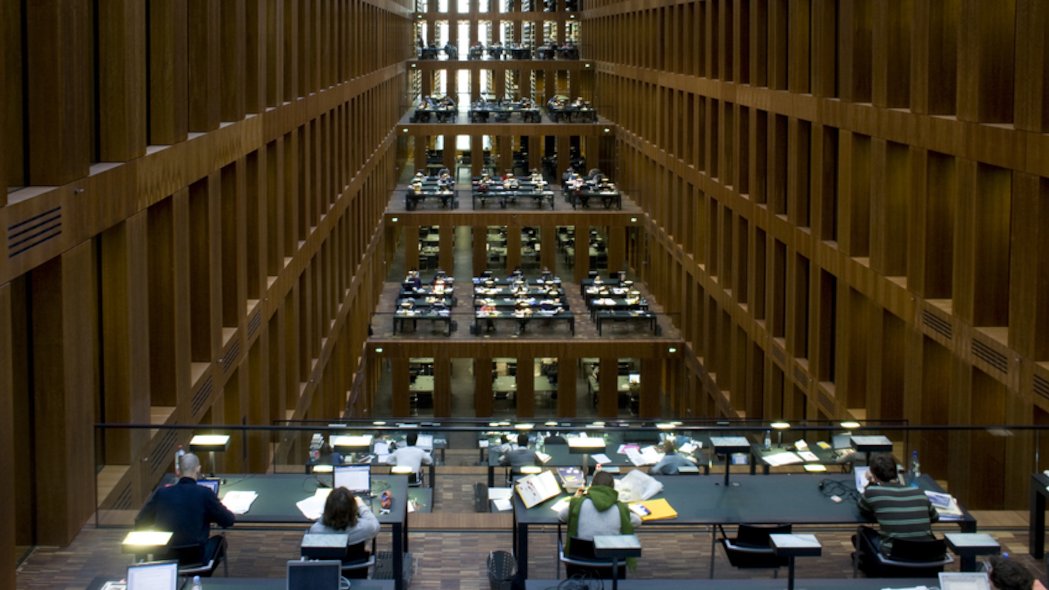Archive, library, documentation
In these subjects, everything revolves around information: how is it obtained, systematised, processed, passed on and stored correctly?

Overview of the academic discipline
- Written, visual and audio documents as well as films, maps, plans and other documents are stored in archives. The archive material is organised and indexed using inventories so that it is available for administration, research or the public. Study programmes in this field impart knowledge in information science and archive management. Digitisation is also increasingly demanding skills in the areas of digital long-term archiving and the presentation of information on the Internet.
- Libraries give users free access to information. In addition to printed media, digital media are also increasingly being made available. A distinction is usually made between public and academic libraries. A degree programme in librarianship imparts knowledge in the areas of procurement, presentation, indexing and information transfer.
- Documentation is the compilation and utilisation of documents on specific topics (handwritten or typewritten, printed, drawn or punched, on image and sound carriers or stored electromagnetically). Documentarians are usually trained at universities of applied sciences.
- Information technologies, increasingly specific customer requirements and the transition to a globalised information and knowledge society place increased demands on the acquisition, selection, processing, communication and presentation of information from all areas. Information economists and information scientists design, for example, user-friendly database applications on the Internet, design information and content management systems (CMS), develop electronic marketplaces, online shops or other e-commerce solutions and deal with information and knowledge management in companies and organisations. Information technology, legal and economic methods, theories and tools are used for this purpose.
Worum geht es im Studium?
- In the initial semesters in the field of archives, modules teach key qualifications as well as broad IT skills and the theoretical, practical and methodological basic skills of information science. Building on this, aspects of archival science and archive management are deepened. In addition, there is a broad overview of German history and practical exercises in the basic historical sciences. The programme also focuses on historical education, digital publications, project and knowledge management.
- In the library area, students learn about the structures of the library and information system, library management, IT expertise and mediation, library construction and technology, inventory management, data management, media and information indexing, publications and media studies, library history and library-relevant law.
- Students of information science learn computer science, mathematics, knowledge management, information systems/reception, law, communication and media as well as marketing and quality management.
- Business studies, media and information procurement are on the timetable in the documentation studies programmes. Other subjects include database development, knowledge engineering, information retrieval and specialised information, project and knowledge management and digital publications. In medical documentation, techniques of data structuring, data processing and statistical data analysis are further focal points of the programme in addition to specialist knowledge in biology and medicine.
What are the requirements?
Knowledge of the school subjects computer science, history, maths, economics/law and English is helpful in the field of archival science, library and documentation.
What study programmes are there to choose from?
Most Bachelor's degree programmes that train students for the library and information sector are offered by universities of applied sciences, but some are also offered by universities. The degree programmes are called ‘Library and Information Science’, ‘Information Science’, ‘Book Science’ or ‘Archive Science’. It is also possible to study archives for a career in the public sector (see chapter 3.11.3).
What job opportunities are there after graduation?
Librarians, documentalists, archivists and graduates in the field of information management or information science have different employment opportunities depending on their degree: They work in public and academic libraries, in institutional and government libraries as well as in company or factory libraries of large companies. They also find employment at newspapers, magazines, publishing houses and associations, in archives, at database information services and research centres, in radio stations or at television stations. Depending on the field of work, specialised knowledge is required.
